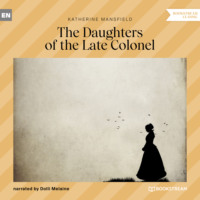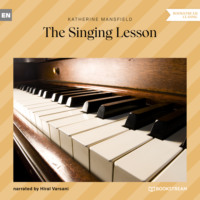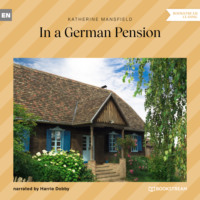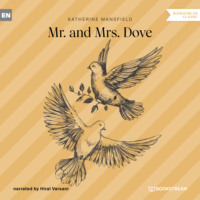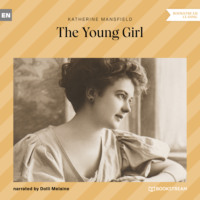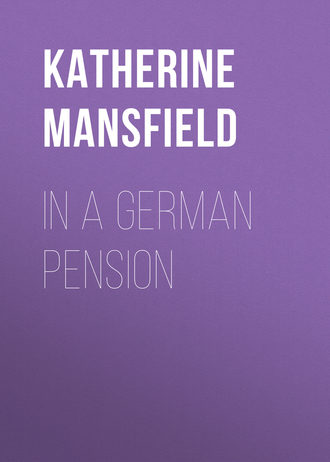 полная версия
полная версияIn a German Pension
Andreas cleared the soup bowl, and cleared the fish. As he ate, the room slowly darkened. A faint wind sprang up and beat the tree branches against the window. The dining-room looked over the breakwater of the harbour, and the sea swung heavily in rolling waves. Wind crept round the house, moaning drearily.
“We’re in for a storm. That means I’m boxed up here all day. Well, there’s one blessing; it’ll clear the air.” He heard the servant girl rushing importantly round the house, slamming windows. Then he caught a glimpse of her in the garden, unpegging tea towels from the line across the lawn. She was a worker, there was no doubt about that. He took up a book, and wheeled his arm-chair over to the window. But it was useless. Too dark to read; he didn’t believe in straining his eyes, and gas at ten o’clock in the morning seemed absurd. So he slipped down in the chair, leaned his elbows on the padded arms and gave himself up, for once, to idle dreaming. “A boy? Yes, it was bound to be a boy this time....” “What’s your family, Binzer?” “Oh, I’ve two girls and a boy!” A very nice little number. Of course he was the last man to have a favourite child, but a man needed a son. “I’m working up the business for my son! Binzer & Son! It would mean living very tight for the next ten years, cutting expenses as fine as possible; and then—”
A tremendous gust of wind sprang upon the house, seized it, shook it, dropped, only to grip the more tightly. The waves swelled up along the breakwater and were whipped with broken foam. Over the white sky flew tattered streamers of grey cloud.
Andreas felt quite relieved to hear Doctor Erb coming down the stairs; he got up and lit the gas.
“Mind if I smoke in here?” asked Doctor Erb, lighting a cigarette before Andreas had time to answer. “You don’t smoke, do you? No time to indulge in pernicious little habits!”
“How is she now?” asked Andreas, loathing the man.
“Oh, well as can be expected, poor little soul. She begged me to come down and have a look at you. Said she knew you were worrying.” With laughing eyes the doctor looked at the breakfast-table. “Managed to peck a bit, I see, eh?”
“Hoo-wih!” shouted the wind, shaking the window-sashes.
“Pity—this weather,” said Doctor Erb.
“Yes, it gets on Anna’s nerves, and it’s just nerve she wants.”
“Eh, what’s that?” retorted the doctor. “Nerve! Man alive! She’s got twice the nerve of you and me rolled into one. Nerve! she’s nothing but nerve. A woman who works as she does about the house and has three children in four years thrown in with the dusting, so to speak!”
He pitched his half-smoked cigarette into the fireplace and frowned at the window.
“Now he’s accusing me,” thought Andreas. “That’s the second time this morning—first mother and now this man taking advantage of my sensitiveness.” He could not trust himself to speak, and rang the bell for the servant girl.
“Clear away the breakfast things,” he ordered. “I can’t have them messing about on the table till dinner!”
“Don’t be hard on the girl,” coaxed Doctor Erb. “She’s got twice the work to do to-day.”
At that Binzer’s anger blazed out.
“I’ll trouble you, Doctor, not to interfere between me and my servants!” And he felt a fool at the same moment for not saying “servant.”
Doctor Erb was not perturbed. He shook his head, thrust his hands into his pockets, and began balancing himself on toe and heel.
“You’re jagged by the weather,” he said wryly, “nothing else. A great pity—this storm. You know climate has an immense effect upon birth. A fine day perks a woman—gives her heart for her business. Good weather is as necessary to a confinement as it is to a washing day. Not bad—that last remark of mine—for a professional fossil, eh?”
Andreas made no reply.
“Well, I’ll be getting back to my patient. Why don’t you take a walk, and clear your head? That’s the idea for you.”
“No,” he answered, “I won’t do that; it’s too rough.”
He went back to his chair by the window. While the servant girl cleared away he pretended to read… then his dreams! It seemed years since he had had the time to himself to dream like that—he never had a breathing space. Saddled with work all day, and couldn’t shake it off in the evening like other men. Besides, Anna was interested—they talked of practically nothing else together. Excellent mother she’d make for a boy; she had a grip of things.
Church bells started ringing through the windy air, now sounding as though from very far away, then again as though all the churches in the town had been suddenly transplanted into their street. They stirred something in him, those bells, something vague and tender. Just about that time Anna would call him from the hall. “Andreas, come and have your coat brushed. I’m ready.” Then off they would go, she hanging on his arm, and looking up at him. She certainly was a little thing. He remembered once saying when they were engaged, “Just as high as my heart,” and she had jumped on to a stool and pulled his head down, laughing. A kid in those days, younger than her children in nature, brighter, more “go” and “spirit” in her. The way she’d run down the road to meet him after business! And the way she laughed when they were looking for a house. By Jove! that laugh of hers! At the memory he grinned, then grew suddenly grave. Marriage certainly changed a woman far more than it did a man. Talk about sobering down. She had lost all her go in two months! Well, once this boy business was over she’d get stronger. He began to plan a little trip for them. He’d take her away and they’d loaf about together somewhere. After all, dash it, they were young still. She’d got into a groove; he’d have to force her out of it, that’s all.
He got up and went into the drawing-room, carefully shut the door and took Anna’s photograph from the top of the piano. She wore a white dress with a big bow of some soft stuff under the chin, and stood, a little stiffly, holding a sheaf of artificial poppies and corn in her hands. Delicate she looked even then; her masses of hair gave her that look. She seemed to droop under the heavy braids of it, and yet she was smiling. Andreas caught his breath sharply. She was his wife—that girl. Posh! it had only been taken four years ago. He held it close to him, bent forward and kissed it. Then rubbed the glass with the back of his hand. At that moment, fainter than he had heard in the passage, more terrifying, Andreas heard again that wailing cry. The wind caught it up in mocking echo, blew it over the house-tops, down the street, far away from him. He flung out his arms, “I’m so damnably helpless,” he said, and then, to the picture, “Perhaps it’s not as bad as it sounds; perhaps it is just my sensitiveness.” In the half light of the drawing-room the smile seemed to deepen in Anna’s portrait, and to become secret, even cruel. “No,” he reflected, “that smile is not at all her happiest expression—it was a mistake to let her have it taken smiling like that. She doesn’t look like my wife—like the mother of my son.” Yes, that was it, she did not look like the mother of a son who was going to be a partner in the firm. The picture got on his nerves; he held it in different lights, looked at it from a distance, sideways, spent, it seemed to Andreas afterwards, a whole lifetime trying to fit it in. The more he played with it the deeper grew his dislike of it. Thrice he carried it over to the fireplace and decided to chuck it behind the Japanese umbrella in the grate; then he thought it absurd to waste an expensive frame. There was no good in beating about the bush. Anna looked like a stranger—abnormal, a freak—it might be a picture taken just before or after death.
Suddenly he realised that the wind had dropped, that the whole house was still, terribly still. Cold and pale, with a disgusting feeling that spiders were creeping up his spine and across his face, he stood in the centre of the drawing-room, hearing Doctor Erb’s footsteps descending the stairs.
He saw Doctor Erb come into the room; the room seemed to change into a great glass bowl that spun round, and Doctor Erb seemed to swim through this glass bowl towards him, like a goldfish in a pearl-coloured waistcoat.
“My beloved wife has passed away!” He wanted to shout it out before the doctor spoke.
“Well, she’s hooked a boy this time!” said Doctor Erb. Andreas staggered forward.
“Look out. Keep on your pins,” said Doctor Erb, catching Binzer’s arm, and murmuring, as he felt it, “Flabby as butter.”
A glow spread all over Andreas. He was exultant.
“Well, by God! Nobody can accuse me of not knowing what suffering is,” he said.
10. THE CHILD-WHO-WAS-TIRED
She was just beginning to walk along a little white road with tall black trees on either side, a little road that led to nowhere, and where nobody walked at all, when a hand gripped her shoulder, shook her, slapped her ear.
“Oh, oh, don’t stop me,” cried the Child-Who-Was-Tired. “Let me go.”
“Get up, you good-for-nothing brat,” said a voice; “get up and light the oven or I’ll shake every bone out of your body.”
With an immense effort she opened her eyes, and saw the Frau standing by, the baby bundled under one arm. The three other children who shared the same bed with the Child-Who-Was-Tired, accustomed to brawls, slept on peacefully. In a corner of the room the Man was fastening his braces.
“What do you mean by sleeping like this the whole night through—like a sack of potatoes? You’ve let the baby wet his bed twice.”
She did not answer, but tied her petticoat string, and buttoned on her plaid frock with cold, shaking fingers.
“There, that’s enough. Take the baby into the kitchen with you, and heat that cold coffee on the spirit lamp for the master, and give him the loaf of black bread out of the table drawer. Don’t guzzle it yourself or I’ll know.”
The Frau staggered across the room, flung herself on to her bed, drawing the pink bolster round her shoulders.
It was almost dark in the kitchen. She laid the baby on the wooden settle, covering him with a shawl, then poured the coffee from the earthenware jug into the saucepan, and set it on the spirit lamp to boil.
“I’m sleepy,” nodded the Child-Who-Was-Tired, kneeling on the floor and splitting the damp pine logs into little chips. “That’s why I’m not awake.”
The oven took a long time to light. Perhaps it was cold, like herself, and sleepy.... Perhaps it had been dreaming of a little white road with black trees on either side, a little road that led to nowhere.
Then the door was pulled violently open and the Man strode in.
“Here, what are you doing, sitting on the floor?” he shouted. “Give me my coffee. I’ve got to be off. Ugh! You haven’t even washed over the table.”
She sprang to her feet, poured his coffee into an enamel cup, and gave him bread and a knife, then, taking a wash rag from the sink, smeared over the black linoleumed table.
“Swine of a day—swine’s life,” mumbled the Man, sitting by the table and staring out of the window at the bruised sky, which seemed to bulge heavily over the dull land. He stuffed his mouth with bread and then swilled it down with the coffee.
The Child drew a pail of water, turned up her sleeves, frowning the while at her arms, as if to scold them for being so thin, so much like little stunted twigs, and began to mop over the floor.
“Stop sousing about the water while I’m here,” grumbled the Man. “Stop the baby snivelling; it’s been going on like that all night.”
The Child gathered the baby into her lap and sat rocking him.
“Ts—ts—ts,” she said. “He’s cutting his eye teeth, that’s what makes him cry so. And dribble—I never seen a baby dribble like this one.” She wiped his mouth and nose with a corner of her skirt. “Some babies get their teeth without you knowing it,” she went on, “and some take on this way all the time. I once heard of a baby that died, and they found all its teeth in its stomach.”
The Man got up, unhooked his cloak from the back of the door, and flung it round him.
“There’s another coming,” said he.
“What—a tooth!” exclaimed the Child, startled for the first time that morning out of her dreadful heaviness, and thrusting her finger into the baby’s mouth.
“No,” he said grimly, “another baby. Now, get on with your work; it’s time the others got up for school.” She stood a moment quite silently, hearing his heavy steps on the stone passage, then the gravel walk, and finally the slam of the front gate.
“Another baby! Hasn’t she finished having them yet?” thought the Child. “Two babies getting eye teeth—two babies to get up for in the night—two babies to carry about and wash their little piggy clothes!” She looked with horror at the one in her arms, who, seeming to understand the contemptuous loathing of her tired glance, doubled his fists, stiffened his body, and began violently screaming.
“Ts—ts—ts.” She laid him on the settle and went back to her floor-washing. He never ceased crying for a moment, but she got quite used to it and kept time with her broom. Oh, how tired she was! Oh, the heavy broom handle and the burning spot just at the back of her neck that ached so, and a funny little fluttering feeling just at the back of her waistband, as though something were going to break.
The clock struck six. She set the pan of milk in the oven, and went into the next room to wake and dress the three children. Anton and Hans lay together in attitudes of mutual amity which certainly never existed out of their sleeping hours. Lena was curled up, her knees under her chin, only a straight, standing-up pigtail of hair showing above the bolster.
“Get up,” cried the Child, speaking in a voice of immense authority, pulling off the bedclothes and giving the boys sundry pokes and digs. “I’ve been calling you this last half-hour. It’s late, and I’ll tell on you if you don’t get dressed this minute.”
Anton awoke sufficiently to turn over and kick Hans on a tender part, whereupon Hans pulled Lena’s pigtail until she shrieked for her mother.
“Oh, do be quiet,” whispered the Child. “Oh, do get up and dress. You know what will happen. There—I’ll help you.”
But the warning came too late. The Frau got out of bed, walked in a determined fashion into the kitchen, returning with a bundle of twigs in her hand fastened together with a strong cord. One by one she laid the children across her knee and severely beat them, expending a final burst of energy on the Child-Who-Was-Tired, then returned to bed, with a comfortable sense of her maternal duties in good working order for the day. Very subdued, the three allowed themselves to be dressed and washed by the Child, who even laced the boys’ boots, having found through experience that if left to themselves they hopped about for at least five minutes to find a comfortable ledge for their foot, and then spat on their hands and broke the bootlaces.
While she gave them their breakfast they became uproarious, and the baby would not cease crying. When she filled the tin kettle with milk, tied on the rubber teat, and, first moistening it herself, tried with little coaxing words to make him drink, he threw the bottle on to the floor and trembled all over.
“Eye teeth!” shouted Hans, hitting Anton over the head with his empty cup; “he’s getting the evil-eye teeth, I should say.”
“Smarty!” retorted Lena, poking out her tongue at him, and then, when he promptly did the same, crying at the top of her voice, “Mother, Hans is making faces at me!”
“That’s right,” said Hans; “go on howling, and when you’re in bed to-night I’ll wait till you’re asleep, and then I’ll creep over and take a little tiny piece of your arm and twist and twist it until—” He leant over the table making the most horrible faces at Lena, not noticing that Anton was standing behind his chair until the little boy bent over and spat on his brother’s shaven head.
“Oh, weh! oh, weh!”
The Child-Who-Was-Tired pushed and pulled them apart, muffled them into their coats, and drove them out of the house.
“Hurry, hurry! the second bell’s rung,” she urged, knowing perfectly well she was telling a story, and rather exulting in the fact. She washed up the breakfast things, then went down to the cellar to look out the potatoes and beetroot.
Such a funny, cold place the coal cellar! With potatoes banked on one corner, beetroot in an old candle box, two tubs of sauerkraut, and a twisted mass of dahlia roots—that looked as real as though they were fighting one another, thought the Child.
She gathered the potatoes into her skirt, choosing big ones with few eyes because they were easier to peel, and bending over the dull heap in the silent cellar, she began to nod.
“Here, you, what are you doing down there?” cried the Frau, from the top of the stairs. “The baby’s fallen off the settle, and got a bump as big as an egg over his eye. Come up here, and I’ll teach you!”
“It wasn’t me—it wasn’t me!” screamed the Child, beaten from one side of the hall to the other, so that the potatoes and beetroot rolled out of her skirt.
The Frau seemed to be as big as a giant, and there was a certain heaviness in all her movements that was terrifying to anyone so small.
“Sit in the corner, and peel and wash the vegetables, and keep the baby quiet while I do the washing.”
Whimpering she obeyed, but as to keeping the baby quiet, that was impossible. His face was hot, little beads of sweat stood all over his head, and he stiffened his body and cried. She held him on her knees, with a pan of cold water beside her for the cleaned vegetables and the “ducks’ bucket” for the peelings.
“Ts—ts—ts!” she crooned, scraping and boring; “there’s going to be another soon, and you can’t both keep on crying. Why don’t you go to sleep, baby? I would, if I were you. I’ll tell you a dream. Once upon a time there was a little white road—”
She shook back her head, a great lump ached in her throat and then the tears ran down her face on to the vegetables.
“That’s no good,” said the Child, shaking them away. “Just stop crying until I’ve finished this, baby, and I’ll walk you up and down.”
But by that time she had to peg out the washing for the Frau. A wind had sprung up. Standing on tiptoe in the yard, she almost felt she would be blown away. There was a bad smell coming from the ducks’ coop, which was half full of manure water, but away in the meadow she saw the grass blowing like little green hairs. And she remembered having heard of a child who had once played for a whole day in just such a meadow with real sausages and beer for her dinner—and not a little bit of tiredness. Who had told her that story? She could not remember, and yet it was so plain.
The wet clothes flapped in her face as she pegged them; danced and jigged on the line, bulged out and twisted. She walked back to the house with lagging steps, looking longingly at the grass in the meadow.
“What must I do now, please?” she said.
“Make the beds and hang the baby’s mattress out of the window, then get the wagon and take him for a little walk along the road. In front of the house, mind—where I can see you. Don’t stand there, gaping! Then come in when I call you and help me cut up the salad.”
When she had made the beds the Child stood and looked at them. Gently she stroked the pillow with her hand, and then, just for one moment, let her head rest there. Again the smarting lump in her throat, the stupid tears that fell and kept on falling as she dressed the baby and dragged the little wagon up and down the road.
A man passed, driving a bullock wagon. He wore a long, queer feather in his hat, and whistled as he passed. Two girls with bundles on their shoulders came walking out of the village—one wore a red handkerchief about her head and one a blue. They were laughing and holding each other by the hand. Then the sun pushed by a heavy fold of grey cloud and spread a warm yellow light over everything.
“Perhaps,” thought the Child-Who-Was-Tired, “if I walked far enough up this road I might come to a little white one, with tall black trees on either side—a little road—”
“Salad, salad!” cried the Frau’s voice from the house.
Soon the children came home from school, dinner was eaten, the Man took the Frau’s share of pudding as well as his own, and the three children seemed to smear themselves all over with whatever they ate. Then more dish-washing and more cleaning and baby-minding. So the afternoon dragged coldly through.
Old Frau Grathwohl came in with a fresh piece of pig’s flesh for the Frau, and the Child listened to them gossiping together.
“Frau Manda went on her ‘journey to Rome’ last night, and brought back a daughter. How are you feeling?”
“I was sick twice this morning,” said the Frau. “My insides are all twisted up with having children too quickly.”
“I see you’ve got a new help,” commented old Mother Grathwohl.
“Oh, dear Lord”—the Frau lowered her voice—“don’t you know her? She’s the free-born one—daughter of the waitress at the railway station. They found her mother trying to squeeze her head in the wash-hand jug, and the child’s half silly.”
“Ts—ts—ts!” whispered the “free-born” one to the baby.
As the day drew in the Child-Who-Was-Tired did not know how to fight her sleepiness any longer. She was afraid to sit down or stand still. As she sat at supper the Man and the Frau seemed to swell to an immense size as she watched them, and then become smaller than dolls, with little voices that seemed to come from outside the window. Looking at the baby, it suddenly had two heads, and then no head. Even his crying made her feel worse. When she thought of the nearness of bedtime she shook all over with excited joy. But as eight o’clock approached there was the sound of wheels on the road, and presently in came a party of friends to spend the evening.
Then it was:
“Put on the coffee.”
“Bring me the sugar tin.”
“Carry the chairs out of the bedroom.”
“Set the table.”
And, finally, the Frau sent her into the next room to keep the baby quiet.
There was a little piece of candle burning in the enamel bracket. As she walked up and down she saw her great big shadow on the wall like a grown-up person with a grown-up baby. Whatever would it look like when she carried two babies so!
“Ts—ts—ts! Once upon a time she was walking along a little white road, with oh! such great big black trees on either side.”
“Here you!” called the Frau’s voice, “bring me my new jacket from behind the door.” And as she took it into the warm room one of the women said, “She looks like an owl. Such children are seldom right in their heads.”
“Why don’t you keep that baby quiet?” said the Man, who had just drunk enough beer to make him feel very brave and master of his house.
“If you don’t keep that baby quiet you’ll know why later on.”
They burst out laughing as she stumbled back into the bedroom.
“I don’t believe Holy Mary could keep him quiet,” she murmured. “Did Jesus cry like this when He was little? If I was not so tired perhaps I could do it; but the baby just knows that I want to go to sleep. And there is going to be another one.”
She flung the baby on the bed, and stood looking at him with terror.
From the next room there came the jingle of glasses and the warm sound of laughter.
And she suddenly had a beautiful marvellous idea.
She laughed for the first time that day, and clapped her hands.
“Ts—ts—ts!” she said, “lie there, silly one; you will go to sleep. You’ll not cry any more or wake up in the night. Funny, little, ugly baby.”
He opened his eyes, and shrieked loudly at the sight of the Child-Who-Was-Tired. From the next room she heard the Frau call out to her.
“One moment—he is almost asleep,” she cried.
And then gently, smiling, on tiptoe, she brought the pink bolster from the Frau’s bed and covered the baby’s face with it, pressed with all her might as he struggled, “like a duck with its head off, wriggling”, she thought.
She heaved a long sigh, then fell back on to the floor, and was walking along a little white road with tall black trees on either side, a little road that led to nowhere, and where nobody walked at all—nobody at all.
11. THE ADVANCED LADY
“Do you think we might ask her to come with us,” said Fräulein Elsa, retying her pink sash ribbon before my mirror. “You know, although she is so intellectual, I cannot help feeling convinced that she has some secret sorrow. And Lisa told me this morning, as she was turning out my room, that she remains hours and hours by herself, writing; in fact Lisa says she is writing a book! I suppose that is why she never cares to mingle with us, and has so little time for her husband and the child.”


